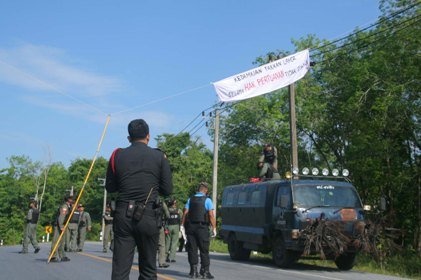Peace in the far South will be evasive unless…
The fact that about 100 plus cloth banners mostly carrying one common political statement were hung in many public places in Yala, Pattani and Narathiwat provinces and two districts of Songkhla on April 22 was widely reported in national and local media. It has also become a subject of widespread discussions.

Written in Roman alphabets, the statements in Malayu language were translated differently by the media. Some of them reported that the statements read "Negotiations will not take place if the owners of the land do not recognize them". Other media reported that the statements read "Peace will not occur if the owners of the land do not recognize them."
However, a Malayu language expert maintained that most banners carry a common statement which read "Peace will not occur if the owners of the land do not recognize them."
Given all the statements which appeared on the banners, it could be assumed that there was no rejection of the ongoing peace talk process between the government and the Barisan Revolusi Nasional (BRN) separatist group. But the common expression was that the peace process would not lead to real peace in the restive region "so long as the ownership right is not recognized".
This language expert explained that the definition of the phrase "ownership right" covers the existence of the owners which includes language, religion and culture which are inseparable from territory.
The big question is: Does the peace process between the government and the BRN mean that the government has recognized the existence of the ethnic Malayu Muslims and their ownership right to the land? Or does it mean that the territory in question is part of the Thai kingdom and the ethnic Malayu Muslims are just residents.
How these people fit in with the Thai society as the national religion of Thailand is Buddhism. They represent the minority in Thailand but they are the majority in the far South which used to be part of the Sultanate of Patani, an autonomous state like the Sukhothai, Ayutthaya or Rattanakosin kingdoms.
The Thai government’s peace talk delegation’s initial insistence that the peace dialogue process must be undertaken within the framework of the Constitution might be a condition that the other separatist groups besides the BRN have rejected the process. But this does not mean that I support the dialogue process to be undertaken outside the framework of the charter. The truth is that there are some sensitive issues which should not be discussed publicly or should be recorded in writing.
Let us not to be too pessimistic. In previous peace talks since Haji Sulong, there has never been a demand for independence from the Malay Muslims – not even the recent banners cry for independence.
The peace process can still be saved but something needs to be changed – that is our attitude towards the Malay Muslims. Can we accept the differences such as their use of the Malayu language? Do the officials understand the sensitivity of the language issue?
It is not necessary that people who live in Thailand must speak Thai only. People of other races such as Malay should be allowed to speak their mother tongue. This is a challenge that we must overcome as we have been dominated by mono culture for so long that we have rejected anything different.
It is about time that all sectors of the society must address this issue in earnest. Because recognizing the existence of the others who are different from us will bring about justice and equality which are prerequisites for peaceful co-existence.
-----------------------------------------------------------------------------------------------------------------------
Caption : One of cloth banner was hung in public place in Yala.
Note : This article was translated from the editorial of Isra News Center http://bit.ly/11gBnOp
